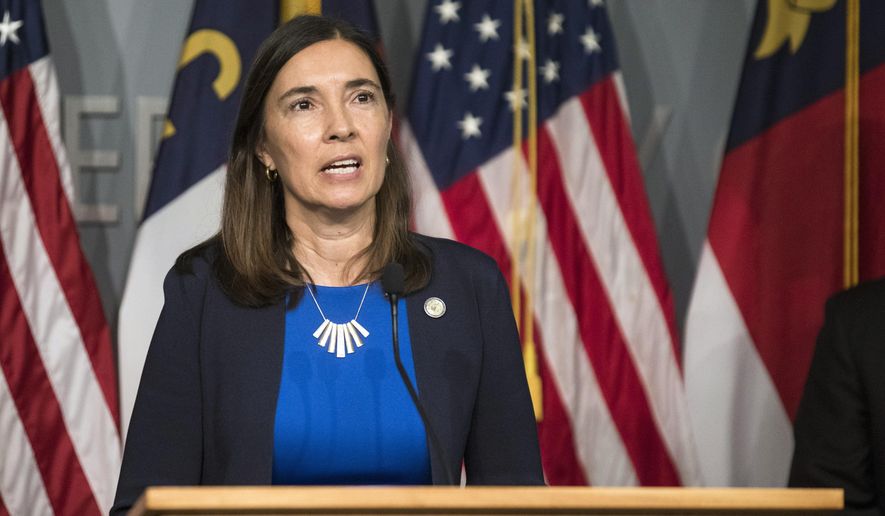The North Carolina Supreme Court heard a new round of arguments Tuesday in a case that tests the “independent state legislature theory” that could upend how election laws are made.
The rare rehearing came after the U.S. Supreme Court heard arguments in December on the same case. Legal experts say there’s a lot of uncertainty about the outcome of one of the thorniest issues before the federal justices this term.
At issue is the legislative district map drawn by the Republican-led North Carolina Legislature and state court rulings blocking the maps’ use. The Legislature said that under the terms of the Constitution’s elections clause it — not state courts — should have the final say over election changes.
The state Supreme Court rejected those arguments in a 4-3 ruling last year.
But the composition of the state high court changed after last year’s elections, and the state justices granted the rehearing.
Several of them challenged the Republican-drawn maps as inherently unfair, saying that contravened the state constitution.
Justice Anita Earls said there was evidence the GOP-drawn maps were an extreme partisan gerrymander in favor of Republicans.
“You’re asking us to say in spite of those facts, the North Carolina Constitution offers no protection to voters?” Justice Earls said.
Justice Trey Allen, though, worried about how deeply courts could be roped into intervening, pointing to the number of counties and municipalities that also draw legislative lines.
“We have over 500,” Justice Allen said. “Are you then inviting our court to take charge of redistricting not just of Congress, not just for the legislature, but for … 500 different municipalities?”
The case has drawn the attention of election experts because of the independent state legislature theory. Proponents point to the U.S. Constitution’s elections clause, which says, “The Times, Places and Manner of holding Elections for Senators and Representatives, shall be prescribed in each State by the Legislature thereof.” The lawmakers said that clause gives legislatures the final say.
Liberal legal scholars say if the federal justices back that theory, it could wipe out a number of changes courts have forced on elections administrators over the years — and particularly in the time since the coronavirus pandemic struck.
Some North Carolina justices said Tuesday that the federal high court should wait until the state court is done with the case.
“Here we are in the same case, continuing to do things,” said Justice Richard Diet. “If jurisdiction requires a final judgment or decree of a state court, you can look at just what’s happening in this case and say it doesn’t seem to have happened in this case.”
Josh Blackman, a professor at South Texas College of Law, said there are a number of novel questions that may have prompted the state court to take a do-over.
“Never before had the North Carolina court relied on its 200-year-old constitution to drastically alter how elections operate in the state,” Mr. Blackman said. “There is also a separate issue of whether the state court can revisit the issue while the matter is pending before the United States Supreme Court. Likewise, there is a question of whether the Supreme Court can decide the matter after the state court rules.”
“There is a lot of uncertainty here,” he added.
The U.S. Supreme Court this year asked for additional briefing on what the state rehearing means, which prompted some legal scholars to say the justices were looking for a way to declare the case moot.
But Curt Levey, a court-watcher at the Committee for Justice, said the federal justices asked for briefing on whether the original state high court ruling constituted a final judgment.
“Importantly, that question is independent of whether the N.C. Supreme Court ultimately reverses its earlier judgment and thus shouldn’t be affected by the substance of today’s rehearing. The final judgment question is instead a purely legal one for which Supreme Court precedent provides no clear answer,” Mr. Levey said.
• Stephen Dinan contributed to this report.
• Alex Swoyer can be reached at aswoyer@washingtontimes.com.




Please read our comment policy before commenting.